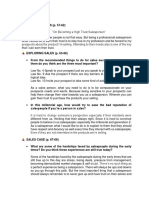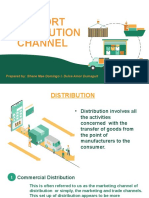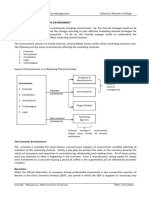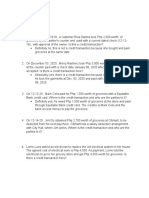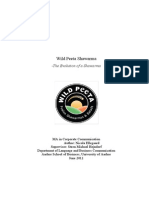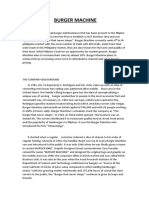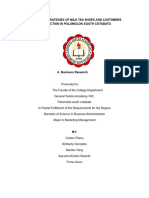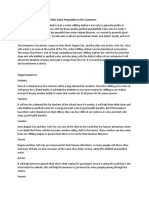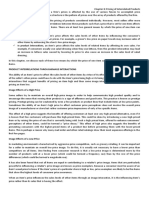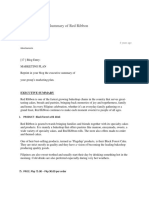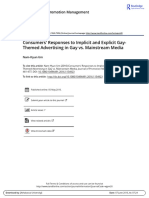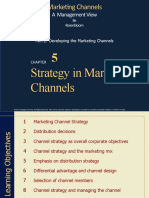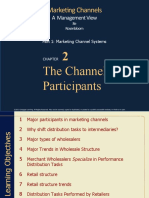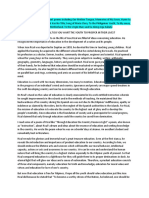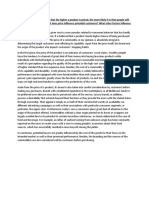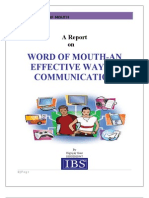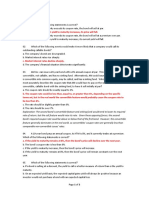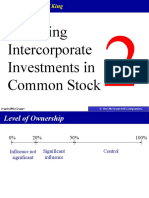Submitted by: Mary Jane A.
Resente CBET-19-502E
Submitted to: Dr. Ester T. Edralin September 29, 2020
CHAPTER 1: MARKETING CHANNEL CONCEPTS
SUMMARY:
This chapter discuss the competitive advantages of Marketing Channel on how the flow of the
channel, how these channels are arranged, how to categorize them and explains the ancillary function.
This chapter highlight the growing importance of marketing channel by dealing the Burst of Information
Technology and E-Commerce that give the reason to focused on that “channel” and to help channel
manager to have a better decision if it’s good to reduce the intermediaries (Disintermediation) or need
to create a new type of intermediary (Reintermediation). Also, it discuss the definition of marketing
channel from two perspective; (1) one’s perspective which defined as a consumer vs. manufacturer, (2)
perspective of a marketing manager which viewed as “the external contactual organization that
management operates to achieve its distribution objectives”. In addition, this chapter defined what
channel manager is and how someone in a firm complex in marketing channel decision-marketing. How
marketing channel strategy intricate in marketing mix because the channels are under “place” which are
in marketing mix that helps marketing manager to have a good marketing channel to support and
enhance their distribution strategy. With those two aspects will benefit to have a competitive
advantages like Long-term viability, Cannot be copied quickly, Cannot be duplicated with price, and
cannot be substituted with a clever idea or short-term promotional program. The important discussion
in this chapter is the flow of marketing channel from Product flow to Negotiation flow, Ownership flow,
Information flow and Promotion flow. From the product flow which actual physical movement of the
product from manufacture to the final consumer, while negotiation flow is the conversation between
seller and buyer, ownership flow which are the movement of title of the product from point A to point
B, Information flow implicate in two way process which are the customer are giving information to
manufacturer and the manufacturer also giving information through actual delivery and receiving the
product and last part Promotion flow refers to how the product will advertise , persuade the customer,
�sales promotion and publicity. Through this chapter help us to know about marketing channel. the
customer sale us if
Discussion Question #1
ROCKAUTO.COM is a leading online auto parts store that prides itself for offering a huge
selection of auto parts, everyday low prices, fast shipping, and an easy-to-use Web site. Some
ROCKAUTO.COM advertisements have even claimed that this online auto parts store is “head and
shoulders” above any brick and mortar auto parts store. The company’s slogan, “All the Parts Your Car
Will Ever Need,” suggests that customers have all the choice they could possibly want from
ROCKAUTO.COM and that they need look no further than this online auto parts store to satisfy all their
needs.
Do you agree with ROCKAUTO.COM’s claim? Might customers seeking auto parts need other
channel options? Explain.
Everything rely upon its plan of action in business, we can’t deny the claim of ROCKAUTO.COM
that they are offering a huge selection of auto parts, everyday low prices, fast shipping, and an
easy-to-use Web site. But Customers have different preferences in choosing product and
different product experiences that might lead to them to rebuy or not. In order to satisfied
customers, ROCKAUTO.COM should evaluate continuously how effective there business model
or marketing mix. First they should maintain those various auto parts, and expand their
warehouse because if not customer will find other online store. Second, make a best decision
when sourcing supplies it will be a good for ROCKAUTO.COM if they can consider the location
because the cost of shipment can also affect the profit and at the same time the price of the
product, these are the things that ROCKAUTO.COM should consider in order not to drive away
customer.
Discussion Question #3
Growth in online retail sales has been outstripping conventional sales in retail stores. This online
sales growth might be enhanced significantly by the latest online sales phenomenon of mobile
commerce—shopping via mobile smart phones such as Apple’s iPhone, Research in Motion’s Blackberry,
or Google’s Nexus One. But so far, of the almost 50 million smart phone users that have access to the
Internet, only about 7 million (under 15%) have actually bought something through their phones during
the course of a year.
Do you think mobile commerce via smart phone will grow rapidly in the future? Why or why
not?
Yes its possible because it more handy to customer to shop online without using their desktop.
Brands are now investing on Mobile-commerce because of the fact that every year thousands or
millions of people are now using smart phone with that mobile commerce can open a new
market which are a consumer who using their phone when purchasing product. The good all
days of retail setting is customer tend to go the store, makes a purchase, and leaves with that a
business can only gain a little insight or data from customer but in mobile-commerce provides a
better consumer data that give valuable signals how consumer purchase their product that helps
them to improve and maximize the sales. Many of biggest company like lazada and shopee who
launch their business in an online platform and target smart phone users because many of
� research about e-commerce stated that a lot of consumer use smartphone for shopping,
communicating to the brands and accessing discount/coupon. In short, mobile commerce offers
retailers and brands significant advantages, whether they're attempting to arrive at another
market or revealing another item. The information and access that mobile commerce provides
can be an excellent way to expand market share.
Discussion Question #5
One of the major themes presented in this chapter is the need for choice as to how products
and services are made available to customers. Thus, multi-channel strategies that provide a wide range
of channels including an Internet based online channel option have become imperative. Yet there are
very successful firms that take a virtually opposite view by purposely limiting choice. A case in point is
Edward Jones, a financial services company with the largest network of brokerage offices in the U.S.—
more than 10,000 and still growing. Edward Jones has a Web site that its customers can visit but it does
not offer its customers the option of trading online. Instead, all transactions must take place through an
Edward Jones broker. Even with this single channel strategy, the company is still growing and is very
profitable.
Why do you think Edward Jones has been able to “buck the trend” toward multi-channel
strategy that would include an online channel as a key option?
The channel strategy of Edward jones is great and effective because of the fact that he engage
first in online channel where he can target a certain customer and provide the service through
broker to the end. Even though that he is using single channel, his business model design
providing financial service that cater by the largest network of brokerage increased benefits
based on the customer's requirements, competition etc. and the service channel is managed
based on how the customer would react to after experiencing the product or service. This is why
his company is still growing even the strategy are different from his competitors because he
provide an excellent service toward the clients by engaging on the largest network of brokerage.
But his strategy can be a very critical decision as the customers can make or break the company
because the fact that a customer always find something more accessible and more convenient
than the rest will affect his company, the best thing he can do is to improve his online channel
by adding more options to make more convenient for the clients.


